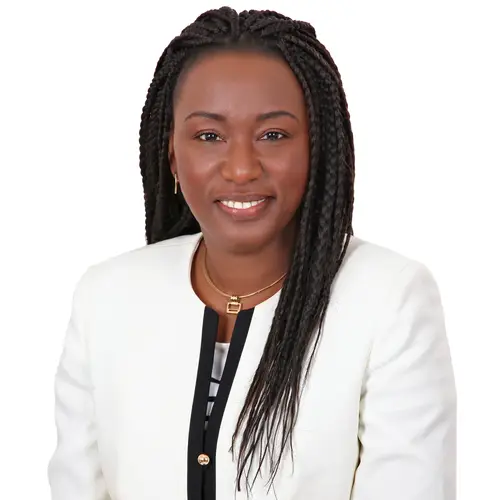
Aissata Fofana
Chief of Party, USAID Guinea Malaria Bilateral StopPalu+
Dr. Fofana has 20 years of experience in global health program implementation in Guinea and 10 years of experience managing staff and large, complex, donor-funded global health programs. As Chief of Party for the USAID StopPalu program she led a team that contributed to reducing malaria prevalence in Guinea from 44 to 15 percent and continues to serve as a strong leader as Chief of Party on the follow-on project, StopPalu+. Dr. Fofana possesses a diverse blend of clinical, health systems strengthening, health promotion, behavior change communication, and management skills.
Q: Have you ever encountered a gender barrier or challenge in your career? If so, how were you able to overcome it?
Yes, when a woman occupies a position of responsibility in an environment where there are more men, the first challenge you face is the difficulty of having others respect your authority. Often people think you do not deserve the position because of stereotypes; they are not used to seeing women who are knowledgeable making decisions. To overcome these challenges, I try to create an environment where all ideas are welcome. I do many coaching and capacity building activities with my team through collaborative discussions and feedback. I set an example by showing that only a job well done pays, meaning leads to success. Every time I make a comment, I make sure that it is objective and that the team itself recognizes that the remark is relevant and fair.
Q: What does being a leader mean to you in your role?
As the leader of a talented team working to improve health outcomes in Guinea, I strive to create an environment where everyone feels comfortable sharing and defending their ideas, where team building is encouraged, and where supporting one another is held in high esteem. I capitalize on the strengths of each team member and don’t dwell on their weak points, rather noting those weaknesses as areas for improvement and capacity building. As a leader, I am also the person who unites a diverse group of people to work toward a common goal.
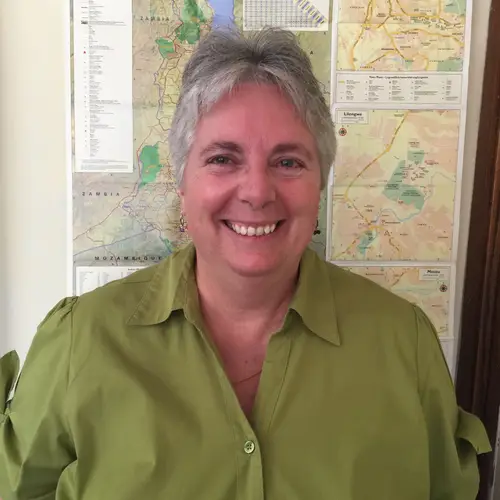
Barbara A. Greenwood
Chief of Party, USAID Malawi Early Grade Reading Improvement Activity
Barbara went from teacher, to education coordinator to Chief of Party (COP) within a 10-year period (and has been in COP role for over 14 years). She is known for creating and leading high-functioning teams. Barbara’s goal is that each member on her team recognizes and strives to reach their potential. She has the same hope for women she has mentored outside of her organization. Barbara feels fortunate to be a role model and mentor to women of all ages and was recently told by a new Acting COP that she stops and thinks WWBD (What would Barbara do?), a humbling compliment.
Q: Who are your role models/which women inspire you?
I have been fortunate to have had many strong female role models in my family and also in my career. My grandmother, Nana Gardner was the cornerstone to the family. Nana’s views on a woman’s role in and outside of the family evolved over time, showing me change is possible. My mother Lola Greenwood encouraged me to follow my dreams, always supporting the path I wandered down, even if she did not understand. My first Mentor was Justine Murray, my Peace Corps Director (Dominica '89-'92). She showed me the importance of innovation and thinking outside of the box. As a young, starry-eyed Peace Corps Volunteer, I was impatient and ready to throw my hands up in defeat. Justine listened to the challenges and together we made changes to the project I was assigned, piloting a Life Lab model for the agriculture and science curriculums in grades 1–6. Thanks to my mentor, I learned to look at a problem from many different angles, and more importantly learned it was OK to ask for help.
Q: What advice would you give to younger women entering your field?
Speak up, find your voice and take ownership of the value you bring. Simple advice, but not always the easiest to follow. Throughout my career I have come across many amazing women, and they succeeded by knowing and articulating the value they brought to the table. I am an introvert by nature, but at an early age I took on roles that forced me to speak and to push me outside of my comfort zone. Stepping outside of my comfort zone (joining clubs, speaking publicly, being a team leader) gave me experiences (including failures), skills and opportunities that have led me to where I am today.
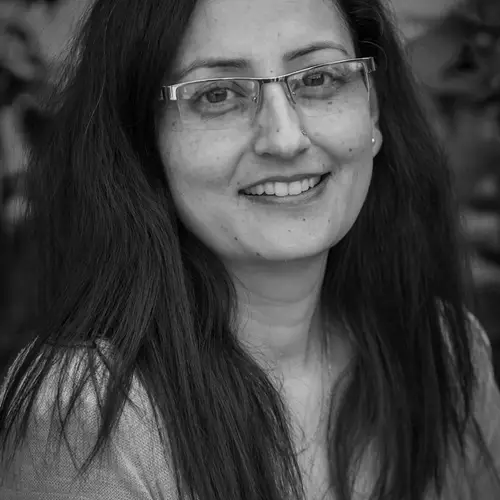
Deepti Silwal Bhattarai
Finance and Grants Manager, USAID ENVISION
Deepti manages the finances and grants for USAID’s ENVISION project in Nepal, a global flagship project working to control and eliminate neglected tropical diseases. Deepti is an expert in her field of financial management, which is often skewed male. In her position at RTI, Deepti plays a strong leadership role and is looked up to by the staff on her team. She is passionate about helping other women succeed, mentoring colleagues, and helping them to grow into new opportunities.
Q: Who are your role models/which women inspire you?
I am inspired by every woman who believes in herself and stands by her dignity, despite the odds of life. Everyone has their own struggle in terms of getting access to resources and opportunities, be it a celebrity, myself or the woman next door. In my work on USAID’s ENVISION project, I get the opportunity to work with Nepal’s female Community Health Volunteers (FCHV), a group of women volunteers providing community health services. I cherish their effort, volunteer hours, and significant contributions to the health system of Nepal. I believe women are superbly powered from within to balance their family and career responsibilities with so much care, empathy, and tolerance. For me this world is beautiful because of the essence of womanhood.
Q: What does being a leader mean to you in your role?
Being a leader, it is important to have open and appropriate communication, moral support, and clarity of vision. Everyone has different skills and potential in a team, and a leader must identify individual potential and inspire those around them toward achieving the objective at hand. On my team, many women (including myself) are very busy with family responsibilities and it is not easy to manage this work/life balance. As a supervisor, I try to support my team, both women and men, in handling their work smoothly and helping to identify appropriate resources for our team to support one other.
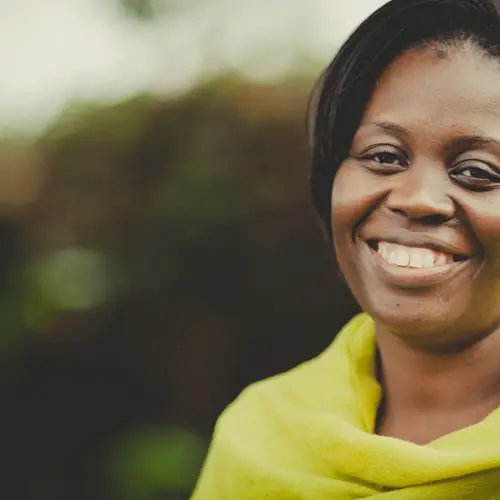
Eva Mulema Matsiko
Chief of Party, USAID Uganda Governance, Accountability, Participation and Performance program
Eva Matsiko is an experienced Program Manager with more than 20 years of professional experience, including 16 years of experience providing strategic leadership, management, and technical expertise to complex USAID- and DFID-funded democracy and governance programs. For the last 6 years, Ms. Matsiko has served as the Chief of Party for the Governance, Accountability, Participation and Performance (GAPP) program working to improve Uganda’s enabling environment for effective service delivery. Under GAPP, Ms. Matsiko is a champion for gender equality and social inclusion (GESI) in a male-dominated environment and is integrating a GESI lens into political economy analysis–supporting a more politically informed approach to “thinking and working politically” for the Government of Uganda.
Q: What excites you most about your work with RTI?
In my work with RTI, I am proud to have the opportunity to work with other really skilled and passionate people to influence the effectiveness of leaders and governance systems in my country. We are privileged to connect, resource, challenge, and encourage leaders to aspire to higher standards and achieve more. With weak systems, limited resources, and demotivated staff, many leaders get discouraged in our local governance systems. In addition, good and well-intentioned ideas at times fail because their implementation was not properly thought through. One of the great aspects of my job is that we get the opportunity to support these men and women in their roles, helping them become more effective leaders who achieve more for their respective communities.
Q: What does being a leader mean to you in your role?
Being a leader means that I must have a clear understanding of what the program was set out to achieve. It is my responsibility to nurture an environment where the different skills and abilities of staff are harnessed and utilized. I must also continually seek opportunities and partnerships that enable us to achieve these objectives. I work to remove obstacles for my team to enable them to be as effective as they can be. Leadership also means that ultimately, I am responsible for setting and maintaining high standards. That does not mean I have it all figured out, but I continually learn and practice ways in which to be better and more effective at what we do.
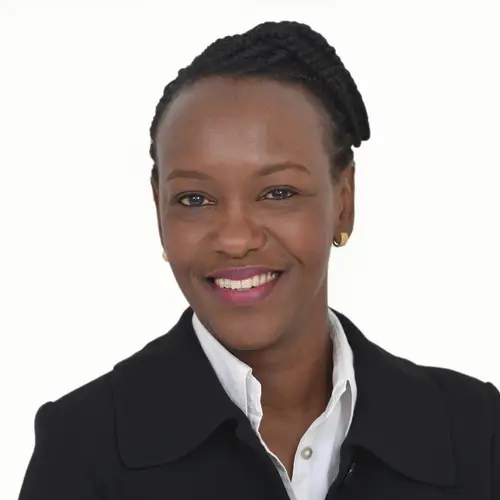
Jamila Kombe
Senior Research Energy Specialist, USAID Power Africa
Jamila Kombe is a recognized power pool expert and electrical engineer with 15 years of experience in power systems and energy trading experience in the Southern African region. Under the East Africa Energy Program, she is responsible for ensuring the integration of the power systems of member East African countries and the establishment of a unified regional wholesale electricity market. She has held several leadership positions in an industry that is traditionally male-dominated and has worked to increase gender equity in the energy sector throughout her career.
Q: What excites you most about the work you do at RTI?
I am most excited about having the opportunity to power Africa and make a lasting difference in the continent. Through my work, I get an opportunity to increase access to electricity for the remaining two thirds of Africa without electricity. I also get to work on increasing trade between various East African countries, stimulating economies, and creating jobs, while doing so sustainably.
Q: Have you ever encountered a gender barrier or challenge in your career? If so, how were you able to overcome it?
Yes, I have encountered a gender challenge in my career. Since I have been working in a male-dominated field, I have felt that I have had to prove myself 10 times more than my male counterparts. To overcome this challenge, I have worked to ensure that this does not affect my performance. I choose to work more on developing myself to be a better person in everything that I do and focus my attention on self-development so that I achieve the same level of competence as my male counterparts.
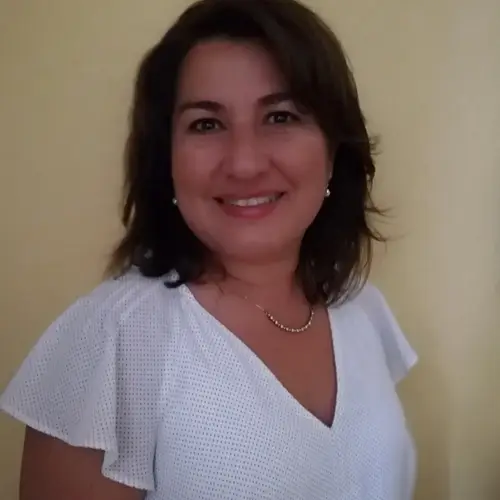
Mariela Chavarriga
Risk Management Specialist, Regional Disaster Assistance Program/Office of U.S Foreign Disaster Assistance (OFDA), USAID
A disaster risk management professional with more than 10 years of experience, Mariela has championed the inclusion of gender issues in disaster risk reduction as a Disaster Risk Management Specialist on the Regional Disaster Assistance Program (RDAP). She has supported OFDA’s efforts to integrate gender issues into its programming and is highly regarded by Chile's national disaster response organization. She is a respected leader working in a complex environment where women are typically not at the forefront of disaster risk management work.
Q: What excites you most about the work you do at RTI with OFDA?
Risk reduction and response to disasters have been a fundamentally male-dominated field in Latin America. As a Disaster Risk Management Specialist, I work closely with OFDA and am in a privileged position to be heard and to influence public policy and disaster risk reduction programs in my country, which other countries could use as a model. Being a woman and being able to contribute my abilities and gender perspective has helped me to break down barriers and prejudices. In collaboration with OFDA and the Chilean National Emergency Management Office (ONEMI), we developed disaster response kits and outreach material tailored for women and introduced a Risk and Gender Management course for emergency responders. I encourage my peers to examine the unique needs of women, children, seniors, and the disabled in disaster response programs.
Q: What advice would you give to younger women entering your field?
I would tell young women that disaster response is not just a man’s job—nor is it a job just for firemen or search and rescue. Disaster response includes a large field of work where women have invaluable roles and skills. As the number and impact of disasters increase, societies must be educated about these threats, vulnerabilities, and response strategies. Young women play a critical role in leading, managing, educating, and advocating for gender equity so that no one is left behind when disaster strikes.

Veralucia "Mimi" Ishan
Senior Program Specialist, USAID Nigeria Effective Water, Sanitation, and Hygiene Services (E-WASH) program
Mimi Veralucia Ishan is a water and sanitation expert with over 14 years of experience in community-led total sanitation, program management, hygiene promotion, and strategic planning. As the Abia State Team Leader for the USAID Effective Water, Sanitation, and Hygiene Services (E-WASH) Program in Nigeria, she leads the team responsible for transforming the state water utility to provide expanded essential urban water services through a pro-poor approach. She is paving the way for female participation, engagement, and leadership in Nigeria’s heavily male-dominated WASH sector, proving by example and ability the value of women’s contributions to deliver this vital resource to urban communities.
Q: Who are your role models/which women inspire you?
I admire my mother and the values she stood for. She got married to my father when she was 16 and had all four of us when she turned 22. My mother’s kindness and generosity were consistent, and she supported the health needs of community members at the expense of her salary. She would pay for their hospital bills with her salary cut sometimes into the next month. She did this without expecting to be paid in return.
Q: Have you ever encountered a gender barrier or challenge in your career? If so, how were you able to overcome it?
I started my career as a geologist and faced a lot of sexism. Later in my career when I entered the development world, I also found myself confronted with a battlefield of challenges where I had to stand for the values I uphold and not compromise both my profession and belief. Women are meant to make the difference and create enabling environment for development to thrive, we see issues deeper than our male counterparts and must be allowed to play our roles where we eventually become game changers.

